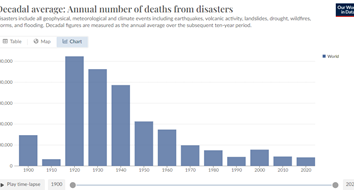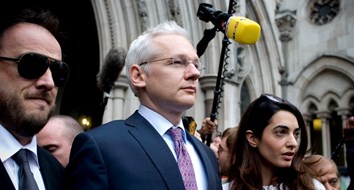The final 2020 presidential debate aired Thursday night. It was a lively affair but not quite as messy or nasty as the first confrontation between President Trump and former Vice President Biden.
In some ways, the debate was even encouraging. We saw the candidates argue over whose administration would be more humane to immigrants, and quarrel over whose administration would push harder for needed criminal justice reforms. These are good signs of progress.
But perhaps the most pivotal moment of the debate came near the end, when Trump and Biden sparred over energy and the environment. On these issues, the candidates found almost no common ground. Biden touted solar and wind as the energy sources of the future, which Trump called “a pipe dream.”
“Solar, I love solar,” said Trump in typical Trumpian fashion. “It’s not powerful [enough] yet to run our big, beautiful factories that we need to compete with the world.”
Trump then urged the moderator to ask Biden about fracking, an industry that has grown substantially in the US in recent years, particularly in states such as Pennsylvania and Ohio.
“I have never said I oppose fracking,” Biden responded.
Trump disagreed, arguing that Biden has done so on tape.
“Show the tape,” Biden challenged. “Put it on your website.”
Trump said he would do so. (While no video is currently up on the campaign’s website, Trump did tweet the video below.)
Here you go @JoeBiden! pic.twitter.com/UBqPJT85Pt
— Donald J. Trump (@realDonaldTrump) October 23, 2020
The exchange was lively, but what was even more interesting is what happened next. Perhaps sensing an advantage, Trump challenged Biden with a simple question.
“Would you close down the oil industry?” the president asked.
Biden, normally a disciplined speaker, took the bait.
“I would transition from the oil industry, yes,” Biden said.
This response even seemed to perplex the debate moderator, who asked Biden, “Why would you do that?”
“The oil industry pollutes significantly,” he continued. “It has to be replaced by renewable energy over time.”
Biden’s candor was a bit remarkable. Politicians are renowned for hedging and offering vague responses to straightforward questions. As the Associated Press reports, even the president himself seemed “surprised and pleased by Biden’s comment.”
The Biden Campaign tried to backtrack after the debate, telling reporters he was only talking about oil subsidies. But even in his clarifying comments, Biden indicated he still plans to get “rid of fossil fuels.”
“We’re getting rid of the subsidies for fossil fuels, but we’re not getting rid of fossil fuels for a long time,” Biden said, according to The Guardian.
A closer look at Biden’s record shows an extensive history of publicly promising “to get rid of fossil fuels” through legislation. This would be dangerous.
The oil and gas industry is one of the largest sectors of the US economy, representing nearly 8 percent of the nation’s entire GDP, according to figures from the American Petroleum Institute.
Politicians like to point out that oil and gas account for more than 10 million jobs in the US, since they’re appealing to voters, and voters’ ears perk up at jobs numbers. But the truth is these workers represent a sliver of those who benefit from these fossil fuels. Every person who fuels her car with gasoline, every person who heats his home with natural gas or heating oil, benefits from this energy sector.
In fact, every consumer of most goods and services benefits from the tremendous production efficiencies made possible by fossil fuels. As Matt Ridley put it,
“The story of energy is simple. Once upon a time all work was done by people for themselves using their own muscles. Then there came a time when some people got other people to do the work for them, and the result was pyramids and leisure for a few, drudgery and exhaustion for the many. Then there was a gradual progression from one source of energy to another: human to animal to water to wind to fossil fuel. In each case, the amount of work one man could do for another was amplified by the animal or the machine.”
As Ridley further explained, in his book The Rational Optimist, fossil fuels are what “made modern living standards possible…”
Despite these benefits, fossil fuels continue to have a bad reputation. They often are described as “dirty” and an “addiction”—as if they’re a filthy, harmful narcotic—but the truth is they help sustain the vast majority of human life on the planet.
While America’s economy is less reliant on fossils than previous decades—fossils fuels accounted for 94 percent of all US energy consumption in 1966 —they still represent the lifeblood of our economy, roughly 80 percent of the nation’s energy consumption, according to federal statistics.
“Fossil fuels are not a self-destructive addiction that is destroying the planet,” noted Alex Epstein in his best-selling book The Moral Case For Fossil Fuels. “They are a life-enhancing technology that is improving the planet.”
There’s a tendency to see fossil fuels as a uniquely dirty pollutant, but this view ignores the enormous technological advances in recent years—from clean coal and fuel-efficient cars to electrogeochemcial carbon capture and chemical looping—that have made fossil fuels cleaner and more sustainable in both the short and long term.
This view also ignores uncomfortable realities about the true environmental costs of renewable technologies. Solar panels,electric cars, and windmills simply aren’t as green as people think. They require energy inputs to manufacture, some of which are considerable and come with environmental impacts that are quite harmful. For example, Tesla’s lithium batteries have a massive carbon footprint, while solar panels produce enormous amounts of toxic waste.
Even more fundamentally, as Ridley explained:
“Moreover, it is an undeniable if surprising fact, often over-looked, that fossil fuels have spared much of the landscape from industrialisation. Before fossil fuels, energy was grown on land and it needed lots of land to grow it. Where I live, streams flow free; timber grows and rots in the woods; pasture supports cows; skylines are not scarred by windmills – where, were it not for fossil fuels, these acres would be desperately needed to power human lives.”
Ridley contrasted this with the massive environmental footprint of wind power:
“Wind turbines require five to ten times as much concrete and steel per watt as nuclear power plants, not to mention miles of paved roads and overhead cables. To label the land-devouring monsters of renewable energy ‘green’, virtuous or clean strikes me as bizarre. If you like wilderness, as I do, the last thing you want is to go back to the medieval habit of using the landscape surrounding us to make power.”
Discussions about the merits and drawbacks of various energy sources are important. However, any plan to force the US economy off life-sustaining fossil fuels through government coercion—in 2025, as Biden said during the debate, or in 2050 as he said afterwards—should be rejected.
Such a plan would be not just foolish, but dangerous to the tens of millions of Americans who rely on fossils fuels every day.





